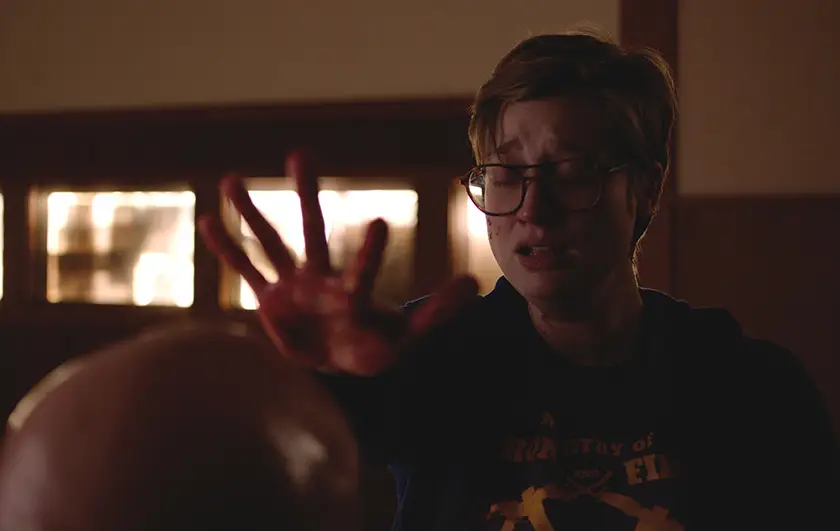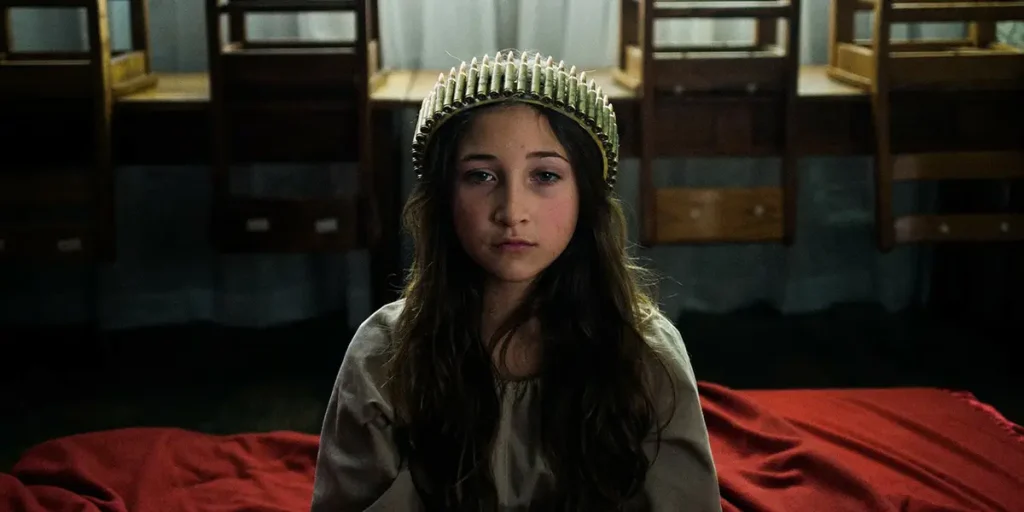So Fades the Light is a cult thriller with a focus on mental trauma, but its script and ending dull its strong imagery and aesthetics.
Director: Rob Cousineau & Chris Rosik (Get Super Rad)
Genre: Psychological Drama, Thriller
Run Time: 86′
U.S. Release: June 24, 2025
U.K. Release: TBA
Where to Watch: On digital and on demand
In writer-director duo Chris Rosik and Robert Cousineau’s second feature film, So Fades the Light, Sun (Kiley Lotz) has grown up and mostly avoided memories of her childhood in a cult known as the Ministry of Iron and Fire. She’s living out of her van until the inescapability of her experience confronts her, and she decides to return home to reckon with her past. She doesn’t yet realize that the Ministry’s leader, the Reverend (D. Duke Solomon) has just been released from prison and intends to return home as well.
So Fades the Light explores the trauma that people carry after leaving a cult, and gives ample attention to spirituality and organized religion. It tells the story of Sun’s personal experience, using her quest home as a metaphorical depiction of her growth. Everyone she meets along the journey is spiritual in some way, and their advice aids in her healing and renewed perspective on life and God. These interactions are interesting and naturally move the story along to its conclusion, but there is an overabundance of scenes of her driving from one place to the next. As the main plot involves this road trip, several of the scenes in which she is driving contain pertinent elements to the story, but this grows repetitive and less engaging as the film continues.
Nevertheless, Sun’s journey back to the grounds of the Ministry is interesting enough to set the film up for jolting thrills and plot twists. The characterization of the Reverend as well as the overall writing of the cult in So Fades the Light seem to draw inspiration from David Koresh. In the famous standoff between his cult and the FBI in Waco, Texas in 1993, he had trained everyone to fight for the protection of their compound. The imagery of Sun as a child, donning a crown made of ammunition and holding an AK-47, is simple yet haunting. The aesthetic of So Fades the Light is the strongest factor contributing to this slow-burn, emotional expedition. Flashbacks and found footage of the Reverend’s dealings with his congregation rely on various shots of an old church and its shadowy rooms.

Unfortunately, the script does not complement the film’s imagery. Though it deserves credit for featuring dialogue between characters that sounds like everyday conversation, it doesn’t convey the weight of its subject deeply. While trying to make profound statements about trauma, mental health, religion, God, morality, personhood, and growth, the script falls into derivative and shallow patterns that minimize its overall impact and make it less thought-provoking.
This film can be viewed as both a drama and a psychological thriller: Its focus on Sun’s healing and growth are emotional, but not to the neglect of the violence that comes when encountering a cult whose emblem is weaponry. Kiley Lotz delivers a good performance in both the sentimental and the thrilling scenes, embodying someone who is courageous yet haunted by the toxicity of the Ministry. I was somewhat conflicted about the culmination of Sun’s character arc in the end. I won’t spoil anything, but it seemed that the climactic moments in which Sun made definitive choices about her future and about her spiritual beliefs conflicted with the development she had throughout the film. What started as an action-packed third act was stunted by the film’s final moments. Even though this wasn’t the best end to So Fades the Light, it maintained its commitment to aesthetics and Lotz’s performance was best just before the credits began to roll.
So Fades the Light takes a different approach to the religious cult thriller, highlighting the trauma that results from heavy involvement in radicalism. While it can be somewhat repetitive and surface-level at times, the overall experience is thrilling. This isn’t a perfect film, but it nails the cultish imagery and aesthetics while offering a perspective on religious cults and mental health otherwise rarely explored in cinema.
So Fades the Light: Movie Plot & Recap
Synopsis:
Fifteen years after leaving a cult in which she was worshiped as the “God-child,” Sun decides to confront her past instead of running from it. Throughout her emotional and personal trip home, she deconstructs her previous notions of religion. She doesn’t know, however, that the cult’s former leader is also headed back home.
Pros:
- Aesthetics and imagery of the cult are its best factor.
- Solid acting performances from Kiley Lotz and D. Duke Solomon.
Cons:
- The script is shallow and derivative.
- The ending is anti-climactic.
- Too many scenes were repetitive.
So Fades the Light will be available to stream on demand from June 24, 2025.
Loud and Clear Reviews has an affiliate partnership with Apple, so we receive a share of the revenue from your purchase or streaming of the films when you click on some of the links on this page. This won’t affect how much you pay for them and helps us keep the site free for everyone.

